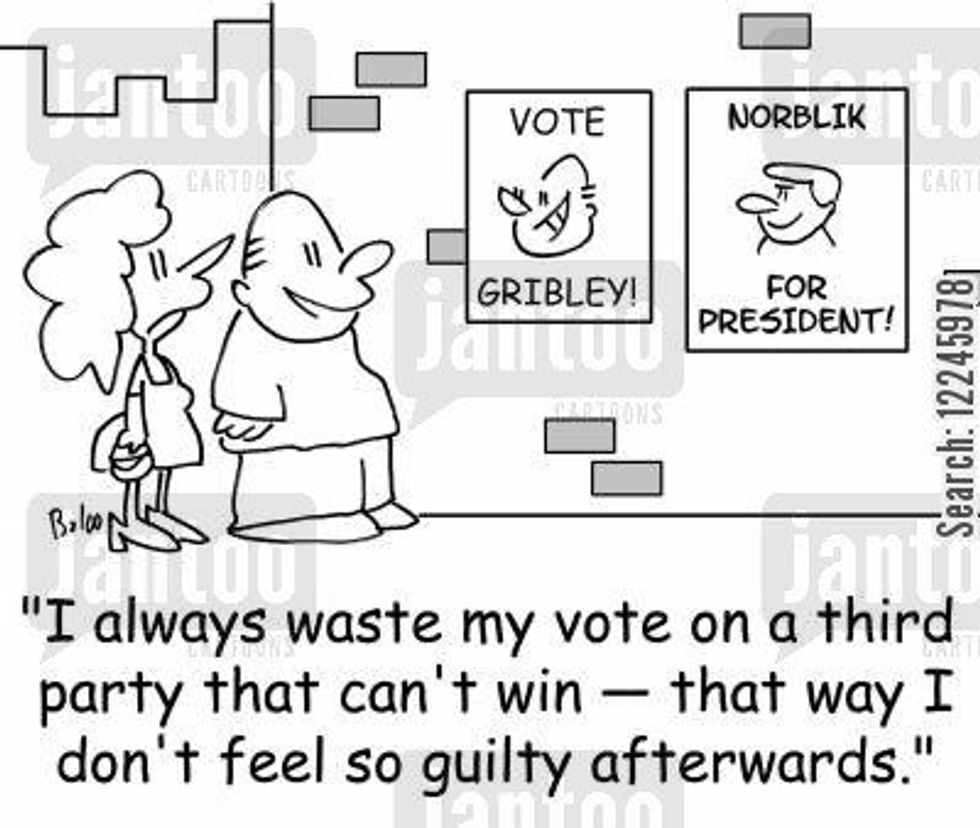Currently, in the United States, the voting system that we use to elect most of our political leaders is called the Plurality method. In it, a voter is given a ballot with a list of candidates on it, and they select the one candidate that they prefer the most. All of the votes are tallied up, and the candidate who receives the most votes wins the election. There are additional complications for the office of President, which requires that a candidate receive over 50% of the votes, in a subset of the Plurality known as the “first past the post" method. Those complications are certainly not always beneficial since the Electoral College artificially increases or decreases the impact of certain peoples' votes. Still, for almost every other office in the country, we use the simple and basic Plurality method.
We have been using the Plurality method for over two hundred years and doing fairly well, so what is the problem? The problem is that, mathematically speaking, it is horribly flawed. The Plurality method has all kinds of loopholes that prevent voters from sincerely casting their vote for the person that they think is the best. It discourages the creation of additional political parties that are capable of challenging the two dominant parties, and because of this, it causes those parties to become increasingly polarized as time goes on.
One can safely say this about our system because it is possible to objectively evaluate voting systems based on whether or not they pass certain mathematical criteria. For example, take the Majority criterion. It states that, in a good voting system, any candidate who receives over 50% of the votes will win. Fortunately, this is one of the few criteria that our system passes. Unfortunately, there are a whole host of criteria that it utterly fails.
First and foremost of these is the Clone Independence criterion, which states that, in a good voting system, introducing a new candidate with extremely similar views to a candidate already present will not prevent either of them from winning. Logically, it makes no sense to maintain a system where a candidate that the majority of people support will not be elected because someone else in the race agrees with them. However, in our system, that is the case. For example, Mark Warner of the Democratic party won the Virginia U.S. Senate Election of 2014. If not for the inclusion of Libertarian Party candidate Robert Sarvis, it is extremely likely that Republican candidate, Ed Gillespie, would have won. Sarvis split the Republican vote—he stole votes from Gillespie—and thus effectively elected the candidate that he disagreed with more.
Our failure of Clone Independence encourages people to vote for one of two candidates and discourages the formation of third parties, so that anyone who does not always agree with one of the two major candidates or parties is out of luck. This phenomenon, known as Duverger's Law, is a characteristic of our terrible voting system. For example, people who are socially liberal but fiscally conservative, such as libertarians, have no voice in the current system because neither party represents their views. They must compromise their views if they want to have any effect on the country at large. For more information on the consequences of Duverger's Law, check out Brett Heinz's article on the subject ("Why Third Parties Can't Win").
Also, in a system where only two parties have power, the extremists in those parties are likely to be more politically active, and thus drag their parties further away from each other on the political spectrum between them, "polarizing" the country. This trend has been dividing the public in the United States at a frightening rate over the last twenty years.
That was one criterion, and the consequences of it. Here are a few more.
Our system fails the Betrayal of Favorite criterion—it encourages voters only to vote for the candidate that they think will win, rather than the candidate that they genuinely believe is best for the country. This gives an enormous amount of power to the media because if voters hear that one candidate is popular and that another is not, they are more likely to vote for the first candidate. By "predicting" the success of a candidate, the media can make that candidate win.
Our system fails the Condorcet criterion: if a candidate would win in a head-to-head election against every other candidate, that candidate could still lose. Our system fails the Condorcet Loser criterion: if a candidate would lose in a head-to-head election against every other candidate, that candidate could still win. These could both occur in a situation where the vote is split.
Our system fails the Mutual Majority criterion: if over 50% of voters prefer every candidate in a group to every candidate outside of that group, the winner will not necessarily come from that group. Our system fails the Smith criterion: if every candidate in a group as small as possible would win a head-to-head election against any candidate outside of it, the winner will not necessarily come from that group.
Our system fails the Independence of Irrelevant Alternatives criterion: the election outcome could be changed if a candidate who cannot win decides to run. Our system fails the Local Independence of Irrelevant Alternatives criterion: if the candidate in last place is deleted from all of the votes, the winner might change, and if the candidate in first place is deleted from all of the votes, the loser might change.
Our system fails to be invulnerable to gerrymandering: if voting districts are redrawn, the results of elections could easily be changed. Whoever draws district lines has the power to control the voters. Our system fails to use all of the votes cast in an election: if a voter does not vote for the winner, their vote means absolutely nothing.
Our system fails, our system fails, and our system fails. Maybe it is time to switch to a better system that can better represent the views of the American people rather than leaving massive loopholes.
Many such systems exist, by the way—here is a list of voting systems that pass more of the existing mathematical criteria than ours does: the Schulze method, the Ranked Pairs method, the Majority Judgment method, the Kemeny Young method, the Instant Runoff method, the Copeland method, the Borda Count method, the Approval method, the Range Voting method and more.
Since 2002, over a dozen cities have used the Instant Runoff method instead of the Plurality in various elections, although technically the Schulze and Ranked Pairs methods are mathematically superior to it—they pass almost all of the criteria that it does and many more. Still, all three are superior to the method that is used an overwhelming majority of the time in the United States: the Plurality. If we want a democratic system that can best represent us as a people, then we need to spread the message of changing our voting system.





















